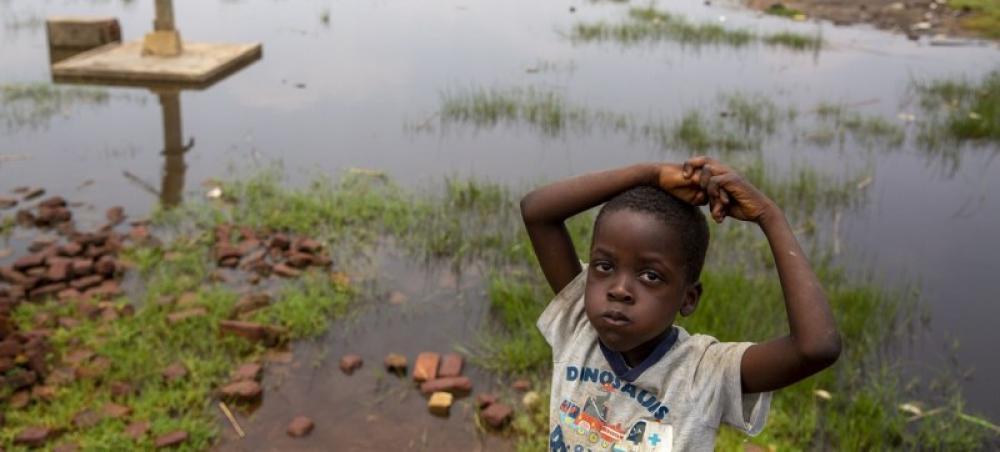Just Earth News | @justearthnews | 25 Jun 2021

New York:The global climate crisis is “exacerbating and intensifying” water-related disasters, jeopardizing lives and livelihoods, the UN chief said on Friday at a major sustainable development symposium.
“For decades, natural disasters, [which] have been one of the major causes of worsening poverty, forcing some 26 million people into poverty each year and reversing developmental gains…are almost always connected to water, whether through floods, storms, droughts, tsunamis or landslides”, Secretary-General António Guterres told the Fifth UN Special Thematic Session on Water and Disasters.
Dangerous trends
Over the past two decades, climate-related disasters nearly doubled compared with the preceding twenty years, affecting more than four billion people, according to the top UN official.
These disasters have claimed the lives of millions and resulted in over $2.97 trillion in economic losses, he said.
Climate change is altering rainfall patterns, affecting water availability, prolonging periods of drought and heat, and increasing the intensity of cyclones, which can lead to horrific flooding events.
“These trends create enormous challenges for our efforts to build more sustainable, resilient communities and societies by implementing the 2030 Agenda for Sustainable Development”, the UN chief said, warning that they will accelerate over the course of the Decade of Action.
And by 2030, projections suggest a staggering 50 per cent jump in humanitarian needs stemming from climate-related disasters.
Upping commitments
Limiting global warming to 1.5 degrees through Nationally Determined Contributions (NDCs) – national plans demonstrating commitment to increasingly ambitious climate action – is crucial to achieve a 45 per cent drop in emissions by 2030 and reach ‘net zero’ by 2050.
However, “we are far off track from meeting these goals”, Mr. Guterres said.
“Current commitments are insufficient, and emissions continue to rise. Global average temperatures are already 1.2°C above pre-industrial levels”.
Bearing down on most vulnerable
At the same time, countries that are most impacted by climate change lack the fiscal space to invest in adaptation and resilience.
“Last year, cyclones lashed the shores of many countries that were already grappling with serious liquidity crises and debt burdens, made worse by the COVID-19 pandemic”, the UN chief said.
Underscoring that “adaptation cannot be the forgotten piece of the climate equation”, he has been advocating for rich nations to mobilize $100 billion annually to assist developing countries and calling for 50 per cent of climate finance to be used on building resilience and adaptation.
“We must ensure that this finance goes to those most in need, particularly small island developing States and least developed countries…on the verge of climate crisis now”, he added.
Recover, rebuild stronger
Prevention and preparedness are essential for responding to and recovering from the COVID-19 pandemic.
This means investing in resilience, meeting water management challenges, and providing water and sanitation services to all, according to the Secretary-General.
“The COVID-19 pandemic was caused by the type of biological hazard foreseen in the Sendai Framework for Disaster Risk Reduction, which emphasizes addressing multiple hazards and interconnected risks”, he recalled, urging everyone to “apply that lens” to policy-making on disaster risk reduction, COVID recovery, and climate adaptation.
Recovery measures must preserve the environment, ecosystems and biodiversity while reversing the damage that has already been done.
Invest in the future
“Investing in resilient infrastructure is an investment in the future”, said the UN chief.
Although more than 100 States have a disaster risk reduction strategy at least partially aligned to the Sendai Framework, dozens have yet to sign on.
Noting that “every $1 invested in making infrastructure disaster-resilient saves $4 in reconstruction”, he urged countries and local governments to accelerate implementation.
In closing, the Secretary-General reminded that disasters derail the Sustainable Development Goals (SDGs), Sendai and the Paris Agreement.
Describing the UN as a “steadfast partner in tackling water and disaster issues”, he pointed to the Decade for Action and the 2023 Water Conference as opportunities to transform water management and achieve the water-related SDGs.
Image: UNICEF/Karel Prinsloo